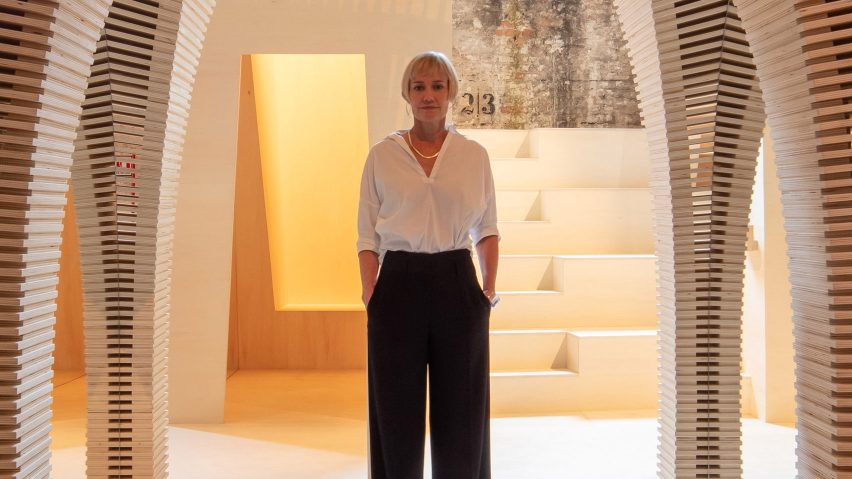This week on Dezeen, we spoke to architect Alison Brooks about how housing design should change after coronavirus and interviewed Killing Eve's set decorator about what it takes to dress a cult TV classic.
According to Brooks, coronavirus is forcing architects to reconsider the importance of amenities like balconies and terraces, as well as space in general.
"Whether or not there's a pandemic, it's really important to have those outdoor spaces," she told Dezeen's Marcus Fairs. "I think there's going to be a value shift."
We chose 10 housing projects that benefit from beautiful balconies where lucky residents can enjoy fresh air.
We also interviewed Casey Williams – the set decorator for BBC's Killing Eve series – who emphasised that each set is driven by the character for whom it is intended.
The apartment created for protagonist Eve, for instance, was designed to reflect her unstable state, while Villanelle's extravagant Catalan-modernist villa in Barcelona was filled with high-end pieces and antique furnishings.
Dezeen interviewed John Burn-Murdoch, the mind behind the daily coronavirus data visualisations created for the Financial Times.
"By visualising the data and the nuance of these different measures and methodologies, we allow people to make an informed decision on whether they're going to believe what they're hearing," Burn-Murdoch told Dezeen.
Dezeen also spoke to sound artist and designer Yuri Suzuki about the importance of good sound design during the pandemic.
According to the designer, increased working and socialising via video conferencing software has made people much more aware of the distracting sounds around them.
This new appreciation for the importance of surrounding sound will make the job of sound designers more important, says Suzuki.
In other coronavirus news from this week, several architects and designers shared their visions of how the design of offices, restaurants and hotels will be impacted after the coronavirus pandemic.
American designer David Rockwell developed a kit that would enable restaurants to extend their existing spaces onto the surrounding pavements and nearby streets to allow for socially distanced dining after Covid-19.
UK architecture studio The Manser Practice also outlined how hotels will change after the pandemic, including the adoption of touch-free access, one-way systems and larger rooms with inbuilt gyms.
Elsewhere in architecture news, protesters gathered at the site of BIG's proposed new national theatre in Tirana, Albania, to campaign against the demolition of a 1930s theatre.
In 2018 BIG unveiled its plans for a new bow tie-shaped building, which would feature three auditoriums and a rooftop theatre.
Over in the design world, Space10 shared its open-source design for a bee home that people can design themselves in celebration of World Bee Day, which took place on Wednesday 20 May.
Dezeen also rounded up seven homes for urban bees, including hexagonal structures designed by Snøhetta and bulbous white chairs punctuated with holes.
Tech entrepreneur James Dyson become the UK's richest man this week and revealed Dyson's cancelled electric car for the first time.
The N SUV would have had a windscreen that "rakes back more steeply than on a Ferrari" and a body made of aluminium.
Other projects popular with Dezeen readers this week include the Hollywood Hills residence in Los Angeles by Marc Thorpe, a cafe in Madrid featuring a hanging vegetable garden and see-through showers, and Lasvit's translucent glass headquarters in Czech Republic.
This week on Dezeen is our regular roundup of the week's top news stories. Subscribe to our newsletters to be sure you don't miss anything.

